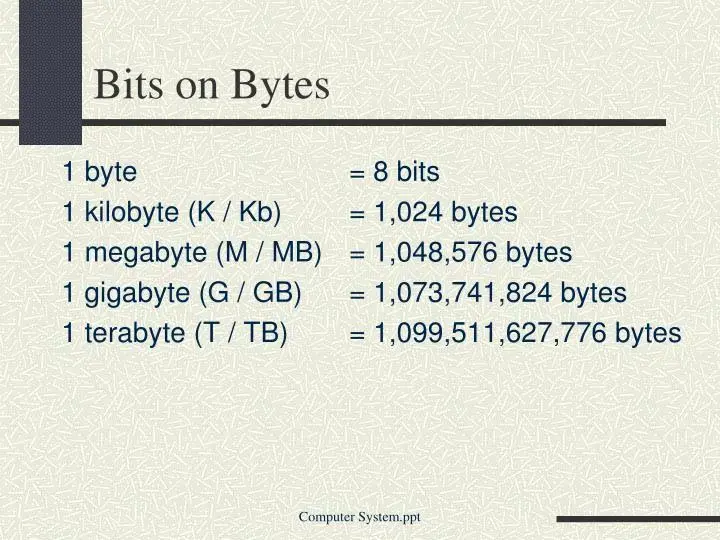
Understanding Data Measurement: Bytes, Bits, and Beyond
Have you ever wondered how the digital world measures its data? Why do we talk about bytes when saving files and bits when discussing internet speed? It's like a secret language, isn't it? Let's unravel this mystery together, in a way that's easy for everyone to understand. Get to know more about the Bytes Bit converter as well. Check out BeBran's Free Byte/Bit Converter Tool.
What are Bits and Bytes: The Building Blocks of Digital Data
Bits and bytes are the alphabets of the digital language. A bit is the smallest unit of data in computing, represented by either a 1 or a 0. Bytes, on the other hand, are made up of eight bits. Together, they form the foundation of all digital information.
Imagine a bit as a single puzzle piece and a byte as the whole puzzle. When you put eight bits (puzzle pieces) together, you get a byte (the complete puzzle). This byte is what stores a single character, like the letter 'A', in your computer.

From Bytes to Kilobytes to Gigabytes
Data sizes grow from bytes to kilobytes (KB), megabytes (MB), gigabytes (GB), and beyond. Each step multiplies by 1,024. For instance, 1,024 bytes make a kilobyte. Think of it like a hierarchy, from a cup of water (byte) to a bucket (kilobyte) to a swimming pool (gigabyte).
Bits in the World of Internet
When it comes to internet speeds, we talk in bits, not bytes. Internet bandwidth is measured in bits per second (bps), indicating how much data can be transferred each second.
Free Tools: Free Case Converter Tool Online | Free SERP Checker Tool Online | Free Small Text Generator Tool Online
The Speed of Data: Understanding Mbps and Gbps
Internet speed is commonly measured in megabits per second (Mbps) or gigabits per second (Gbps). The higher the number, the faster your internet connection. It's like comparing the speed of a bicycle (Mbps) to a race car (Gbps).
Storage vs. Speed: Where Bytes and Bits Meet
Data storage is measured in bytes, while data transfer speed is measured in bits. It's important to know the difference, especially when choosing internet plans or storage devices.
The Impact of Data Measurement in Daily Life
From streaming movies to downloading files, data measurement affects how we experience technology. Understanding these measurements can help you make better choices in using digital devices.
Data Measurement in Multimedia
Media files like photos, videos, and music vary in size. A high-resolution photo takes more bytes than a simple text document. Knowing this helps in managing storage space efficiently.
The Future of Data Measurement
As technology evolves, so does data measurement. The introduction of terabytes (TB) and even petabytes (PB) is becoming more common, especially in big data and cloud storage.
Challenges in Data Measurement
As data sizes grow, challenges in storage, speed, and security arise. Addressing these challenges is crucial for the seamless functioning of digital ecosystems.
Tips for Managing Your Digital Data
Knowing how to manage data effectively, from organizing files to choosing the right storage, is key in the digital age.
The Role of Data Measurement in Business
For businesses, understanding data measurement can lead to better decision-making, especially in areas like data analytics and customer insights.
Understanding bits and bytes is not just for tech experts; it's for everyone in this digital age. By grasping these concepts, you empower yourself in the world of technology. Check out BeBran's Free Byte/Bit Converter Tool.
Explore More: Mastering SEO with SERP Checker Tools: A Step-by-Step Tutorial | Using SERP Checker Tools for Competitor Analysis: Strategies for Outranking Rivals
Frequently Asked Questions
1. What is the difference between a bit and a byte?
A bit is the smallest unit of data, represented as a 1 or 0. A byte consists of eight bits and represents a single character, like a letter or number.
2. Why is internet speed measured in bits and not bytes?
Internet speed is measured in bits to reflect the speed of data transfer. It gives a more accurate representation of how fast data is moving.
3. How does understanding data measurement help in daily life?
It helps in making informed decisions about internet plans, storage devices, and managing digital files effectively.
4. What does Mbps mean?
Mbps stands for megabits per second and is a unit of measurement for internet speed. It indicates how much data can be transferred each second.
5. Why are there different units like KB, MB, GB, etc.?
These units represent different data sizes, much like meters and kilometers measure distance. They help in understanding and managing digital data better.
6. How are data sizes measured beyond bytes?
Data sizes larger than a byte are measured in kilobytes (KB), megabytes (MB), gigabytes (GB), terabytes (TB), and so on. Each unit is typically 1024 times its predecessor, though in some contexts (like hard drive storage), a kilobyte is counted as 1000 bytes for simplicity.
7. What is the difference between a kilobyte and a kibibyte?
A kilobyte (KB) is often used to mean 1000 bytes, while a kibibyte (KiB) strictly means 1024 bytes. The distinction helps avoid confusion between decimal (base 10) and binary (base 2) measurements.
8. Why do computers use binary (bits and bytes) for data?
Computers use binary because it's a reliable and simple way to represent data using two states - off (0) and on (1). This binary system is fundamental to the operation of digital electronics.
9. What is a gigabit and how does it relate to a gigabyte?
A gigabit (Gb) is a unit of data equal to 1 billion bits. It's commonly used in networking and data transfer rates. One gigabit is equal to 125 megabytes (MB), since there are 8 bits in a byte.
10. How is data transfer speed measured?
Data transfer speeds are typically measured in bits per second (bps), kilobits per second (Kbps), megabits per second (Mbps), or gigabits per second (Gbps).



